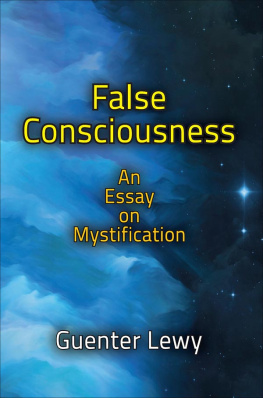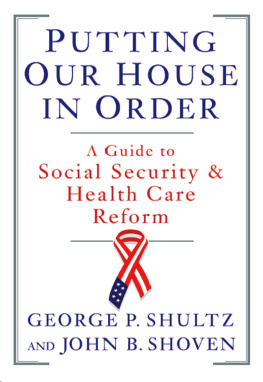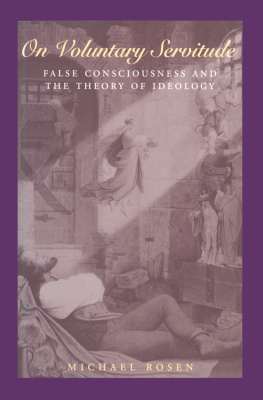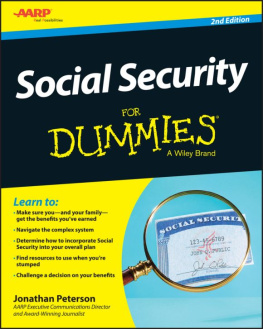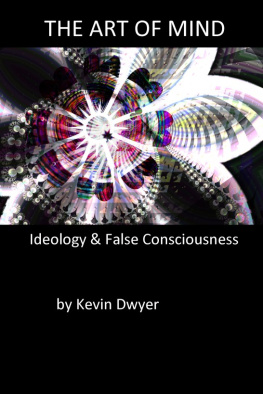Social Security
Social Security
False Consciousness and Crisis
First published 2002 by Transaction Publishers
Published 2017 by Routledge
2 Park Square, Milton Park, Abingdon, Oxon OX14 4RN
711 Third Avenue, New York, NY 10017, USA
Routledge is an imprint of the Taylor & Francis Group, an informa business
All rights reserved. No part of this book may be reprinted or reproduced or utilised in any form or by any electronic, mechanical, or other means, now known or hereafter invented, including photocopying and recording, or in any information storage or retrieval system, without permission in writing from the publishers.
Notice:
Product or corporate names may be trademarks or registered trademarks, and are used only for identification and explanation without intent to infringe.
Library of Congress Catalog Number: 2002072126
Library of Congress Cataloging-in-Publication Data
Attarian, John.
Social security : false consciousness and crisis/John Attarian.
p. cm.
Includes bibliographical references and index. ISBN 0-7658-0127-2 (alk. paper)
1. Social securityUnited States. I. Title.
HD7125 A85 2002
368.4300973dc21
2002072126
ISBN 13: 978-1-4128-0491-2 (pbk)
Dedicated to the Valiant Soldiers of Truth about Social Security
Carl T. Curtis
Judd Benson
Dillard Stokes
Ray Peterson
A. Haeworth Robertson
Peter G. Peterson
And ye shall know the truth, and the truth shall make you free. John 8:32
Acknowledgements
My deep gratitude goes first of all to the Earhart Foundation, for the grant which made possible the research for this book and the completion of the first draft, and to the referees for my grant. Dr. Antony T. Sullivan, Earharts secretary and director of program, merits special thanks for his faith in this project and his sage counsel.
A heartfelt salute to A. Haeworth Robertson, chief actuary of Social Security in 1975-1978, president and founder of the Retirement Policy Institute, and one of the unsung heroes in the battle to educate the country about Social Security. The tribute on the dedication page is the least he deserves. Warmly supportive of my own efforts in that cause, Mr. Robertson not only served as a referee for my grant but read and closely criticized the first three chapters of the first draft. Professor Charles E. Rounds, Jr., of the Suffolk University Law School and an authority on trusts, read and criticized my treatment of the Social Security trust fund in . My work is better for their criticisms. Any remaining errors are mine alone.
I got by with more than a little help from my friends. One of my goals was to produce a book accessible to a broad audience, in hopes of having a constructive impact on the Social Security debate, and Damon Demady, a dear friend and my apartment-mate during the research and drafting period, generously took time out from work on his doctorate in clinical pharmacology to read and criticize the entire first draft for clarity, accessibility, and intelligibility of argument to educated general readers, noneconomists, and nonspecialists in Social Security. Dr. John Wilhelm, a competent economist and good friend, served as a patient and discerning sounding board for several of my criticisms of Social Security privatization. Jeffrey Tucker of the Ludwig von Mises Institute in Auburn, Alabama, gave wise editorial and marketing advice.
Last, but emphatically far from least, a special, warm thanks to Dr. Irving Louis Horowitz, chairman and editorial director of Transaction. His frank and rigorous criticism of the first draft was invaluable in prompting a more fruitful framing of the analysis. Together with an anonymous referee, he made valuable criticisms and suggestions for revisions to the final draft which made for a much stronger book, in particular for a further explication and honing of the concept false consciousness as used here. His enthusiastic support is much appreciatedas is his prompt, crisp, and businesslike response to correspondence, a very rare thing among publishers.
Contents
Index
Preface
One of todays most important national concerns is the projected bankruptcy of Social Security some time in the next few decades and its consequent inability to pay full benefits on time.
Yet despite almost two decades of warnings about this, nothing is being done. The saying that Social Security is the third rail of American politics touch it and you dieholds true. Ever since ferocious opposition routed President Ronald Reagans 1981 proposal to cut some benefits, which inspired that saying, presidents and Congresses have flinched from action that might entail confrontation with current beneficiaries. Most of the proposals and all of the enacted efforts to cut federal spending in the last two decades exempted Social Security.
Changes to ensure Social Securitys long-run solvency could have been made then, giving all concerned ample time to adjust. They were not. Fear of the political cost imposed paralysis.
Realistic observers warn that the longer action is deferred, the more difficult it will be. That is, our procrastination is exacerbating Social Securitys troubles. Our task grows more necessary, difficult, painful and politically dangerous every year. Yet nothing happens.
A deep root of this predicament is a crucial but under-examined aspect of Social Security: the misleading manner in which the program has been depicted to the public from 1935 on. Specifically, Social Security is retirement insurance under which taxpayers pay insurance premiums or contributions to buy protection from destitution in old age, with their contributions being held in a trust fund which will pay guaranteed benefits which, being paid for, will be theirs as a matter of earned right, as America keeps its compact (or contract) between the generations.
The entire previous sentence is demonstrably, documentably false. Sometimes Social Security officials even admitted as much. To gain public acceptance of the program, they depicted Social Security as insurancebut argued just the opposite before the Supreme Court, to ensure Social Securitys constitutionality (Helvering v. Davis, 1937) and to uphold their prerogative to deny beneficiaries their earned right to benefits (Flemming v. Nestor, 1960). Moreover, they never informed the public about Section 1104 of the Social Security Act: The right to alter, amend, or repeal any provision of this Act is hereby reserved to the Congress. Congress has repeatedly exercised this right, and has eliminated, cut, delayed or taxed benefits or denied them to various classes of people, belying the vaunted guarantee and earned right. Yet the foregoing myths have been assiduously propagated to this day. Social Securitys reliance on payroll taxes for revenue lends them strong prima facie plausibility: having paid these taxes, Americans think they have an earned right to benefits, that they have bought insurance protection. In fact, as shall become clear, they have not.
The misleading depiction of Social Security has had extremely pernicious consequences already, and is likely to have far worse ones in the future, some ramifying far beyond Social Security itself.
Conduct is determined by perceptions and beliefs. Much, perhaps most, communication seeks to influence the perceptions and beliefs, and thus the actions, of others. Social Securitys legitimacy, its performance, and its very existence depend decisively upon how taxpayers, politicians and beneficiaries understand it. As an intergenerational redistribution, Social Security depends especially upon the willingness of younger Americans to pay its taxeswhich in turn rests on their beliefs about it.





